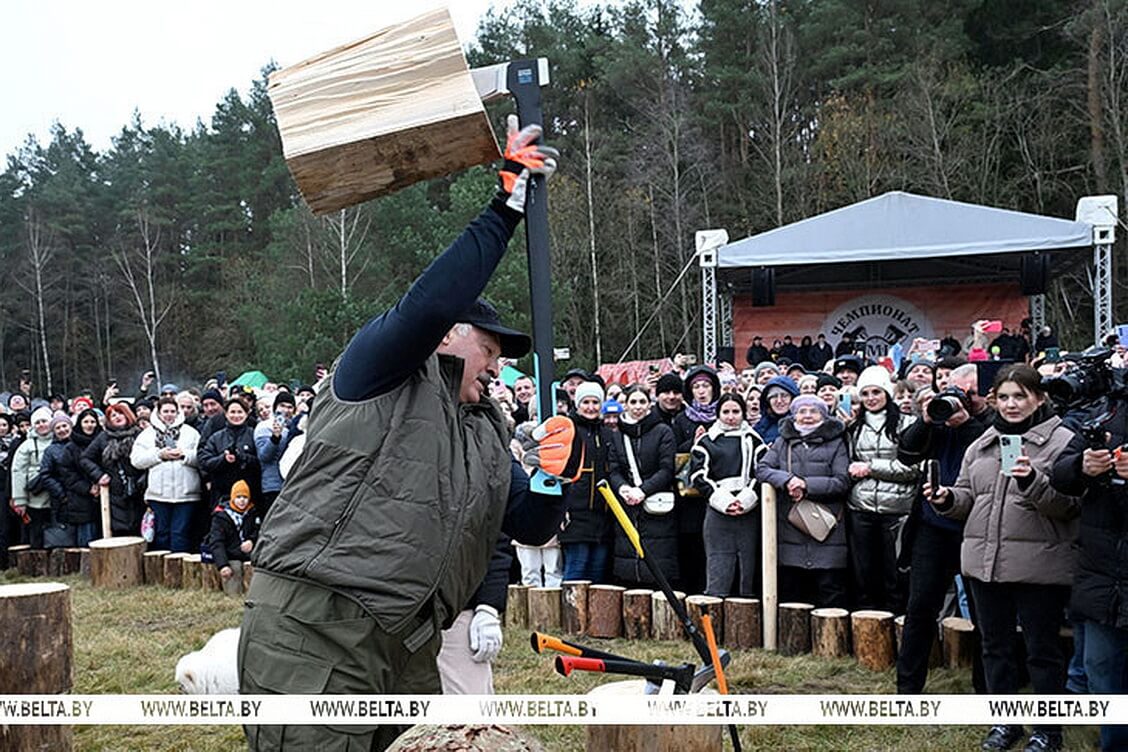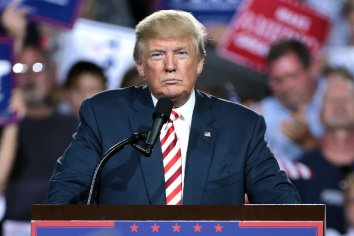Alaksandar Łukašenka praised Donald Trump’s assertive leadership style, noting similarities between himself and the US president-elect. However, the Belarusian strongman remains too insignificant at the international stage to capture Trump’s attention.

Łukašenka pins hopes on Trump
“Trump is mighty. No matter how I feel about him, he’s done well. It was hard to believe he could win. They shot at him, put pressure on him, wanted to put him in jail, etc. Still, he went through like a bulldozer,” Łukašenka said on November 7 at a wood-chopping competition among media workers near Minsk.
Łukašenka described Trump as an “outstanding capitalist” and a “billionaire.” He pins hopes on Trump’s pragmatism, which focuses more on deal-making than promoting liberal values.
However, the question remains: what does Łukašenka have to offer? In a recent propaganda video, Minsk hinted it might be willing to negotiate the release of Juryj Ziankovič, a US lawyer imprisoned in Belarus. Belarus also holds several journalists who worked for RFE/RL, a project funded by the US Congress.
Yet, the mass release of political prisoners—a move that could facilitate rapprochement with the United States—remains problematic for Łukašenka.
Minsk hopes that Trump will persuade Ukrainian President Volodymyr Zelensky to negotiate a peace deal with Russia on terms unfavorable to Ukraine. Such an agreement could weaken Ukraine’s position while strengthening Moscow’s and Minsk’s.
Łukašenka might even have a chance to participate in negotiations over Ukraine. He noted that Trump had pledged to end wars, including the conflict in Ukraine. If Trump succeeds, the Belarusian leader said, he would nominate him for the Nobel Peace Prize.
That remark was particularly cynical, coming from a leader who imprisoned Nobel Peace Prize laureate Aleś Bialacki and forced Nobel Literature Prize laureate Sviatłana Aleksijevič into exile.
Łukašenka also cited Democratic candidate Kamala Harris as an example for the Belarusian opposition on how to concede defeat. His comparison was unfortunate for Trump, who instigated the storming of the US Capitol after his loss in 2020.
The Capitol incident underscored Trump’s unpredictability, which could bring unpleasant surprises for both Moscow and Minsk.
Behind-the-Scenes Talks
The Belarusian ruler could benefit from improved relations with the West, especially the United States. He has delegated this task to Foreign Minister Maksim Ryžankoŭ.
Łukašenka has dropped hints about his behind-the-scenes contacts with Western diplomats, possibly including Kevin Doyle of the US State Department, who was spotted in Minsk last month.
Senior US officials also visited Minsk during Trump’s first term: National Security Adviser John Bolton in 2019 and Secretary of State Mike Pompeo in 2020.
Łukašenka was flattered by the attention. At that time, Minsk had fallen out with Moscow, and Washington sought to draw Belarus closer by offering oil, even sending a couple of tankers.
However, Minsk’s current ties to the Kremlin make dealings with the West unlikely, given Łukašenka’s reputation as a Russian puppet.
Still, Łukašenka continues to send signals to Western politicians. This week, he pardoned 31 more political prisoners, likely a result of the behind-the-scenes negotiations.
Wood-chopping competition highlight import substitution problems
On November 7, Łukašenka gave a “master class” in firewood chopping, according to state media. The event was part of his re-election campaign, aimed at demonstrating his good physical condition amid rumors about his health.
He also showcased a new Belarusian axe made to his specifications. “It’s a little heavier than the imported ones,” he remarked.
The challenges of import substitution are apparent, primarily due to the strained relations with the West, on which Belarus depends heavily for its economy.
Complete substitution is impossible, despite attempts to redirect trade from Western markets to Russia and the Global South. The Belarusian economy is now heavily tied to Russia, which has increased the country’s political dependence on the Kremlin.
While Łukašenka claims that Western sanctions have helped Belarus enter new markets, he has, in rare moments of honesty, described the restrictions as “fascist.”
